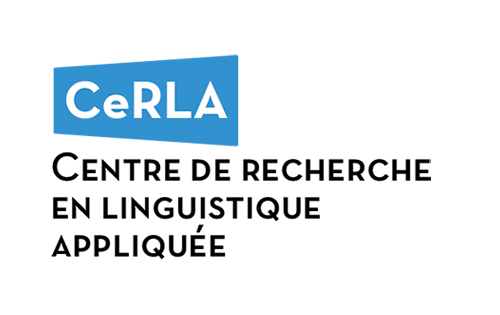Professeur honoraire, angliciste
 christian.bassac@univ-lyon2.fr
christian.bassac@univ-lyon2.frChristian Bassac est professeur émérite de linguistique à l'Université de Lyon2 et membre du CeRLA. Il est également membre du projet de l'ANR (Agence Nationale de la Recherche) LOCI (Locativité et Interaction en Logique Linguistique et Informatique). Il est membre du projet Signes de l'INRIA (Institut National de Recherches en Informatique et Automatique) depuis 2003. De 2004 à 2008 il fut responsable permanent de ce projet, et en délégation à l'INRIA en 2004 et 2005. Il est membre de la société de Linguistique de Paris et de Mathematics of Language (MoL).
Christian Bassac is Professor Emeritus of Linguistics at the University of Lyon2, and a member of the CeRLA. He is also a member of the ANR (Agence Nationale de la Recherche) project LOCI (Locativité et Interaction en Logique Linguistique et Informatique).
He has worked on the project Signes of the INRIA institute (Institut National de Recherches en Informatique et Automatique) since 2003, and was vice head of the project from 2004 to 2008. He was invited scientist at INRIA-Futurs in 2004 and 2005, and he is a member of the Société de Linguistique de Paris.
- Ouvrage
-
- Bassac, C, 2004, Principes de morphologie anglaise, Presses Universitaires de Bordeaux
- Chapitres dans ouvrage collectif
-
a) Bassac, C and J. Busquets (2022) Truth and Proofs. From Tarski’s Convention T to Game Theory. In the Lvov-Warsaw School and contemporary Philosophy of language. Boston. Brill p. 35-64.
b) Bassac, Christian (2021). « Minorité linguistique »: vers une sémantique lexicale, in : Viaut, Alain (dir.). Catégories référentes des langues minoritaires en Europe. Bordeaux : Maison des sciences de l’homme d’Aquitaine, pp. 263-281.
c) Bassac, C, 2018, “The substance of the lexicon in a Generative Lexicon” in Substance-based Grammar – The (Ongoing) Work of John Anderson, Roger Böhm and Harry Van der Hulst (Eds), John Benjamins Publishing Company. https://hal.archives-ouvertes.fr/hal-01991504
d) Bassac, C, 2014, “Rules and exceptions: Neogrammarians and the lexicon”, in Rules and exception, Beedham, Christopher, Danks, Warwick, Soselia, Ether (Eds) Peter Lang.
https://www.peterlang.com/view/9783035305951/9783035305951.00008.xml
e) Bassac, C et Bouillon, P, 2013, “The telic relation in compounds”. In Advances in Generative Lexicon Theory (Text, Speech and Language Technology), James Pustejovsky, Pierrette Bouillon, Hitoshi Isahara, Kyoko Kanzaki, Chungmin Lee (Editors) Series: Text, Speech and Language Technology, Vol. 46 Springer Verlag. Dordrecht, Heidelberg, New York London. pp. 109-126. https://link.springer.com/book/10.1007/978-94-007-5189-7
f) Bassac, C, 2012, “A Combinatory Logic and formal semantic approach to lexical blending”. In Cross-Disciplinary Perspectives on Lexical Blending, Vincent Renner, François Maniez, Pierre Arnaud (Editors). Mouton De Gruyter. Trends in Linguistics. Berlin, Boston, pp. 169-192. https://www.degruyter.com/view/product/183507
g) C. Bassac, 2010, « Philosophy, linguistics and semantic interpretation ». In Philosophy of Language and Linguistics, the Formal Turn, Ontos Verlag, Frankfurt, Pages17-41. www.degruyter.com/view/books/9783110330472/9783110330472.17/9783110330472.17.xml
h) C. Bassac, 2008, "Evénement et référence" in Le point sur la référence en langue / Taking stock of reference in the study of language, Coord. P. Frath et J. Pauchard, Éditions et Presses Universitaires de Reims
i) Bassac, C, and P. Bouillon, 2002, "Middle Transitive Alternations in English: A Generative Lexicon Approach" in Many Morphologies, P.Boucher, (Ed) p. 29-47, Cascadilla Press, Sommerville, MA. http://www.cascadilla.com/manym.html - Articles dans revues à comité de lecture
-
a) Busquets J. et C. Bassac, 2016 « On Something similar » In Journal of Cognitive Science, Volume 17 n°2, pages 263-307. http://cogsci.snu.ac.kr/jcs/index.php/issues/?pageid=2&uid=207&mod=document
b) Bassac, C and Cicek, M, 2013, “On the derivation of nominals in –(y)Iş and -mE in Turkish”, In Lingua, vol 133, pp 230-261 https://hal.archives-ouvertes.fr/hal-01991503
c) Bassac C, Busquets, J et M, Versel, 2010. « Analyse statistique des données textuelles à partir de publications de Calvet concernant les langues minoritaires ». Lengas n°66, p. 57-78. https://journals.openedition.org/lengas/892?lang=en
d) C. Bassac 2010, « Sémantique de la coordination, une brève introduction » in Revue de Sémantique et de pragmatique, numéro thématique « Sémantique de la coordination », pages 7-23.
e) Bassac, C, et Ciçek. M, 2010, « Factorisation des affixes de pluriel et de possessif en turc ». In Revue de Sémantique et Pragmatique, numéro thématique, « Sémantique de la coordination ». Pages 207-230.
f) Bassac, C, Méry, B, et C Rétoré, 2010 « Toward a type theoretical account of lexical semantics », In Journal of Logic, Language and Information, Vol.19, Pages 229-245. https://hal.inria.fr/inria00408308/file/bassac-mery-retorerevised.pdf
g) Bassac, C, 2006 « Un problème de morphologie flexionnelle : l’apposition coordinative en anglais. » In Cahiers de Grammaire, p 9-20. http://w3.erss.univ-tlse2.fr/textes/publications/CDG/30/cdg30.html
h) Bassac, C, 2006, “A compositional treatment for English compounds” in Research in Language, pp 133-153 https://content.sciendo.com/view/journals/rela/rela-overview.xml - Articles dans actes de conférences internationales à comité de programme
-
a) Méry, B, Rétoré, C, et C. Bassac, 2007. "A Montagovian Generative Lexicon," The 12th international conference on Formal Grammar, Dublin. http://citeseerx.ist.psu.edu/viewdoc/download?doi=10.1.1.592.4602&rep=rep1&type=pdf
b) Henry, P, and Bassac, C, 2007, "A tool-kit for a Generative Lexicon," 4th International Conference on Generative Approaches to the Lexicon, Paris, ENS. https://hal.archives-ouvertes.fr/hal-00279936/fr/
c) Bassac, C et Bouillon, P, 2005, "Qualia structure and anaphoric resolution in compounds" in Proceedings of the third International workshop on Generative Approaches to the Lexicon Bouillon, P et K.Kansaki(Ed) Genève
d) Bassac, C, et Cicek, M, 2004, "Les noms déverbaux dérivés par affixation de - (y)Iş et -mE en turc". Colloque international sur les noms déverbaux. Lille
e) C. Bassac and Bouillon P, 2001, "The telic relationship in compounds in French and Turkish". In Proceedings of the First International Conference on Generative Approaches to the Lexicon. Bouillon, P et K.Kansaki (Ed) Genève. - Présentations dans des conférences internationales à comité de programme sans actes
-
a) Bassac, C, 2009, « John Lyons et les grammaires catégorielles » Présentation au symposium « Quel sens pour la linguistique ? » organisé à l’occasion de la remise du doctorat Honoris Causa à Sir John Lyons, Université de Toulouse 2, 23-24 avril 2009. Hand-out.
b) Bassac, C et Ciçek, M, 2004, "Les noms déverbaux dérivés par affixation de - (y)Is et -mE en turc". Colloque international sur les noms déverbaux. Lille. - Recensions
-
- Bassac, C, 2016, Recension du livre Language and Logics. An Introduction to the Logical Foundations of Language de Howard Gregory. http://www.cercles.com/review/r76/Gregory2.html
- Rapports de recherche
-
- Vanier, J, Bassac, C, Henry, P, Marlet, R, et C. Rétoré, 2005, "Toward a knowledge representation model dedicated to the semantic analysis of the sentence". Rapport de recherche, INRIA. https://hal.inria.fr/inria-00084245
- Réalisation en collaboration avec P. Henry, Construction d'un analyseur/générateur des formes verbales du turc. http://signes.bordeaux.inria.fr/turc/turc.html



